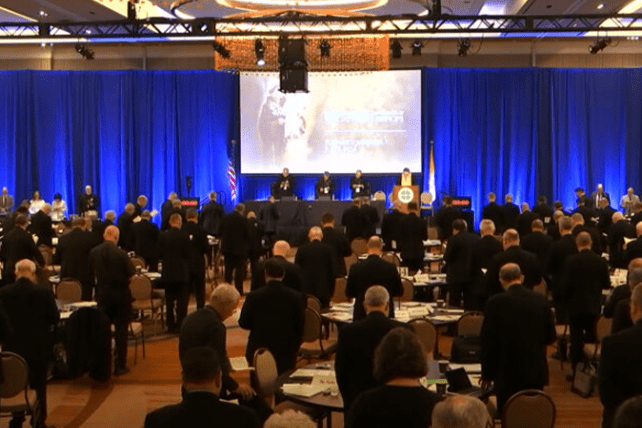“I don’t think there’s been a 50% decline in the collections. This is a 50% cut,” Colecchi said.
The National Catholic Reporter reported that the Catholic Campaign for Human Development’s 2022 collection had seen a $2 million increase from 2021, bringing the collection back to the range it had occupied from 2017 to 2019.
Colecchi, who saw his own office cut by a third during his time with USCCB, argued that the cuts would “cripple the ability of the international office to do a credible job” and that other elements of the department’s work on peace, justice and human rights would suffer.
“The church throughout the world relies on the church in the United States to help direct U.S. policies in ways that are helpful to reducing poverty, reducing conflict, improving health care and education through foreign aid,” Colecchi said, explaining that the office’s staff travels to visit the church in countries experiencing conflict or poverty to hear directly what they need, giving them “enormous credibility with public officials here in the United States,” he said.
Colecchi pointed to the U.S. church’s work supporting the church in Africa as an example of an effort he was concerned would be harmed by the cuts. “The President’s Emergency Plan for AIDS Relief, PEPFAR, will come up for reauthorization and will we have the bandwidth to really take that on?” he asked, saying that the church in Africa had “begged” the office to make sure the embattled program could continue, including as part of a church-run program in South Africa.
Colecchi, who also previously administered CCHD as a diocesan director in the Diocese of Richmond, said he expected that not only the international work, but also CCHD’s domestic anti-poverty work, would be similarly impacted by the staffing cuts.
Noguchi clarified the status of CCHD in the USCCB’s statement to RNS. “While staff of the Catholic Campaign for Human Development (CCHD) have been affected, the national collection itself and the decision to award grants are separate and distinct from yesterday’s announcement. In the interest of good stewardship, the administration of the collection is being reorganized to allow for more efficient management. The CCHD Subcommittee will continue its work,” she wrote.
The statement from USCCB referenced the recent discussions about CCHD, which occurred when the bishops met in Louisville, Kentucky, less than two weeks ago, where many bishops expressed strong support for the program. “As Archbishop (Timothy) Broglio said at the time, ‘in all these discussions, the bishops ongoing commitment to the vital work of fighting poverty was clear,’” Noguchi noted.
Wood, who previously served as a pro bono adviser to the bishops’ conference on CCHD for about eight years, said, “For the layperson sitting in the pew and donating to the Church, there looks to be a disjuncture between these cuts and the bishops’ strong support for CCHD and JPHD at the bishops conference last week.
“That raises questions about governance inside the USCCB today. Those questions need to be answered for the sake of the Church we love,” Wood wrote.
Carr echoed those questions. “Who decided this, who was consulted, why were bishops unaware of this massive disinvestment in its social mission?” he asked.
A smaller, separate office of Government Relations is outside the affected Justice, Peace & Human Development department. In it, five staff focus on influencing government policy on religious liberty, anti-abortion issues, marriage, migration, racism and Catholic education.

